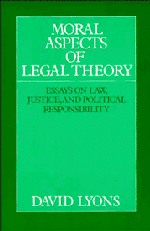Book contents
- Frontmatter
- Contents
- Preface
- Acknowledgments
- 1 The internal morality of law
- 2 On formal justice
- 3 Legal formalism and instrumentalism - a pathological study
- 4 Moral aspects of legal theory
- 5 Formal justice and judicial precedent
- 6 Derivability, defensibility, and the justification of judicial decisions
- 7 Constitutional interpretation and original meaning
- 8 A preface to constitutional theory
- 9 Basic rights and constitutional interpretation
- 10 Critical analysis and constructive interpretation
10 - Critical analysis and constructive interpretation
Published online by Cambridge University Press: 10 December 2009
- Frontmatter
- Contents
- Preface
- Acknowledgments
- 1 The internal morality of law
- 2 On formal justice
- 3 Legal formalism and instrumentalism - a pathological study
- 4 Moral aspects of legal theory
- 5 Formal justice and judicial precedent
- 6 Derivability, defensibility, and the justification of judicial decisions
- 7 Constitutional interpretation and original meaning
- 8 A preface to constitutional theory
- 9 Basic rights and constitutional interpretation
- 10 Critical analysis and constructive interpretation
Summary
This paper concerns two problems of legal practice – interpretation and the justification of judicial decisions. Largely because of Dworkin's work, legal theory now addresses without skeptical presumptions the issue of interpretation, and his “constructive interpretation” is the most important entrant in that field. But legal interpretation (in the relevant sense of discovering the determinate meaning or implications of existing law) is not an end in itself but serves adjudication, which impinges on important human interests. For our purposes, judicial decisions should be viewed not as propositions of law but as things that are done to people in the name of the law. And the things that judicial decisions do to people, such as depriving them of life, liberty, or valued goods, require moral justification.
Many of those who come before courts do so under duress and have lacked a reasonable opportunity to affect the political process. We cannot assume that they would approve of the law that determines their fate or that they are committed in any way to the law that is applied against them. What is done to them in the name of the law requires substantive moral justification. And the fact that something is required by law does not itself provide such a justification. So interpretive legal theory is, or should be, concerned with the justification of judicial decisions. The issues to be addressed include not only logical support for legal propositions but also the moral defensibility of their practical implications.
- Type
- Chapter
- Information
- Moral Aspects of Legal TheoryEssays on Law, Justice, and Political Responsibility, pp. 202 - 217Publisher: Cambridge University PressPrint publication year: 1993
- 1
- Cited by



